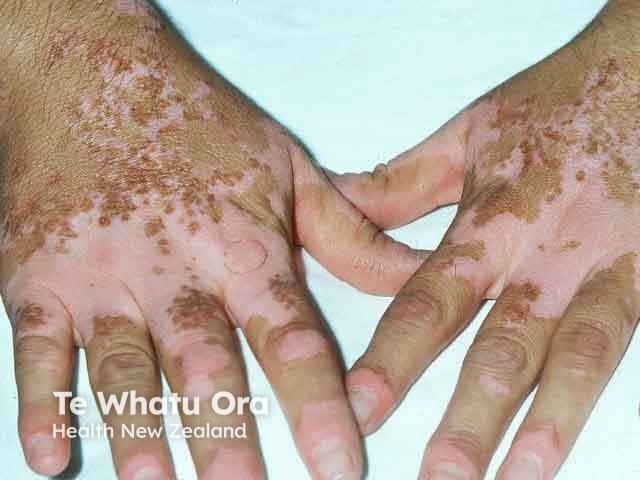Main menu
Common skin conditions

NEWS
Join DermNet PRO
Read more
Quick links
Author: Dr Vanessa Van de Velde, Registrar; Dr Alex Holme, Dermatologist, Royal Infirmary of Edinburgh, Edinburgh, Scotland; Chief Editor: A/Prof Amanda Oakley, Dermatologist, Hamilton, New Zealand, March 2016.
Introduction Demographics Causes Clinical features Diagnosis Treatment Outcome
Alezzandrini syndrome is an acquired disorder of unilateral melanocyte destruction in the skin, hair, eye, and ear.
Only a handful of patients with Alezzandrini syndrome have been described; both males and females between 12 and 30 years old at presentation.
The cause of Alezzandrini syndrome remains unknown. Viral or autoimmune processes leading to melanocyte destruction have been suggested. Melanocytes are located in the skin, retina, uvea, cochlea, and vestibular labyrinth, so any of these sites may be affected.
Alezzandrini syndrome is probably related to Vogt-Koyanagi-Harada (VKH) syndrome, as they share similar cutaneous and ocular signs, except Alezzandrini syndrome is unilateral. Neurological involvement typical of VKH syndrome (8th cranial nerve damage, sterile meningitis) is not reported in Alezzandrini syndrome. The connection between the two syndromes remains unknown.
The initial presentation may be unilateral gradual loss of vision, followed by facial vitiligo and poliosis on the same side several years later. Ipsilateral reduced sensitivity to sound or hypoacusis may also develop. Bilateral deafness has been reported in one patient.

Poliosis

Vitiligo
Alezzandrini syndrome is a clinical diagnosis.
Regular ophthalmological assessment is recommended due to the risk of a poor vision outcome:
Audiometry is undertaken to assess hearing loss.
There are no treatments for Alezzandrini syndrome.
High dose oral steroids should be prescribed if the patient has symptoms suggestive of acute uveitis.
Due to the small number of reported cases, the prognosis of patients with this syndrome remains unknown.
Patients experience a gradual loss of vision and have an increased risk of retinal detachment. Progressive hearing loss has been reported.